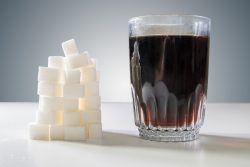 Nearly half of Americans frequently use sugar substitutes to cut calories or sugar. However, their effectiveness in managing body weight is questionable. A recent study shows that the widely used sugar substitute sucralose changes brain activity linked to hunger, boosting appetite, particularly in individuals with obesity.
Nearly half of Americans frequently use sugar substitutes to cut calories or sugar. However, their effectiveness in managing body weight is questionable. A recent study shows that the widely used sugar substitute sucralose changes brain activity linked to hunger, boosting appetite, particularly in individuals with obesity.
The study revealed that sucralose consumption heightened hunger and activated the hypothalamus and brain regions tied to motivation and sensory processing, including decision-making processes. These results indicate that sucralose may affect cravings or eating habits.
Eating sugar raises blood sugar and triggers hormones that signal the brain to reduce hunger by indicating calorie intake. Sucralose, however, lacks this effect, and the hormonal differences between sucralose and sugar are more significant in people with obesity.
The study involved a controlled trial with 75 participants, who consumed water, a sucralose-sweetened beverage, or a sugar-sweetened drink across three separate sessions. Researchers used magnetic resonance imaging to capture brain scans and gathered blood samples and hunger ratings before and after each drink.
Scientists employed MRI to obtain brain scans and collected blood samples and assessed the participants hunger before and after consuming each beverage. The study showed that female participants had more pronounced changes in brain activity than male participants, indicating that sucralose may impact men and women differently.
Sucralose, up to 600 times sweeter than sugar, elevates the sensitivity to sweetness. Being calorie-free, it doesn’t promote fullness and may confuse the brain by delivering sweetness without the anticipated energy. When the body anticipates calories from the sweet taste but gets none, over time it might reshape how the brain regulates cravings for these substances.
Adopting healthy eating habits is more effective for enhancing overall health and reducing the risk of chronic diseases. While all sweeteners should be used sparingly, natural options like honey and sugar provide potential benefits, such as vitamins and antioxidants, unlike artificial sweeteners.
To view the original scientific study click below:
Non-caloric sweetener effects on brain appetite regulation in individuals across varying body weights





